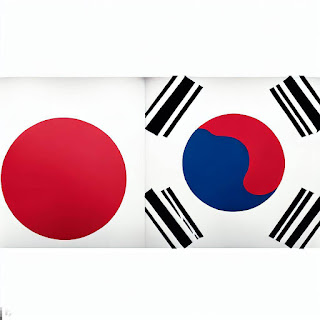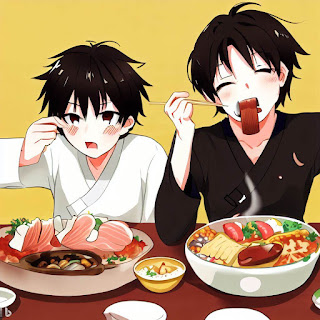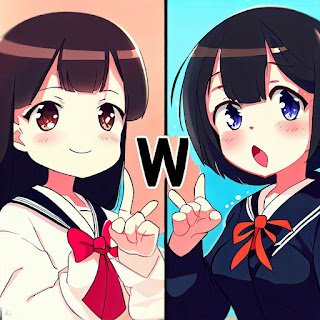The differences between Japan and Korea to foreigners.
# How are Japan and Korea different?
Japan and Korea are two neighboring countries in East Asia that share some similarities, but also have many differences. If you are interested in learning more about their cultures, lifestyles, and customs, this blog post is for you. I will introduce some of the main aspects that distinguish Japan and Korea, and provide some examples and references for further information.
## Language
Japan and Korea both use the same writing system called "hanja" or "kanji", which are Chinese characters that represent meanings and sounds. However, they also have their own alphabets that are completely different from each other. Japan uses "hiragana" and "katakana", which are syllabic scripts that consist of 46 characters each. Korea uses "hangul", which is a phonetic script that consists of 24 letters that can be combined into syllables.
The spoken languages of Japan and Korea are also very different, although they share some words that are derived from Chinese or English. For example, the word for "coffee" is "kōhī" in Japanese and "keopi" in Korean. The word for "computer" is "konpyūtā" in Japanese and "keompyuteo" in Korean. However, most words are not similar at all, and the grammar and pronunciation are also different. For example, the word for "hello" is "konnichiwa" in Japanese and "annyeonghaseyo" in Korean. The word for "thank you" is "arigatō" in Japanese and "gamsahamnida" in Korean.
## Food
Japan and Korea both have rich and diverse cuisines that reflect their history, geography, and culture. They both use rice as a staple food, and enjoy various kinds of dishes that include seafood, meat, vegetables, noodles, soups, and sauces. They also have some common dishes, such as sushi, ramen, kimchi, bibimbap, and tempura.
However, there are also many differences in their food cultures. For example, Japan is famous for its raw fish dishes, such as sashimi and sushi. Korea is famous for its spicy dishes, such as kimchi and bulgogi. Japan uses soy sauce, miso, vinegar, and wasabi as main seasonings. Korea uses red pepper paste, soybean paste, garlic, and sesame oil as main seasonings. Japan prefers to eat food separately on individual plates or bowls. Korea prefers to eat food together on a large communal table with many side dishes.
## Religion
Japan and Korea both have a long history of religious diversity and tolerance. They both have been influenced by various religions, such as Buddhism, Confucianism, Taoism, Shintoism, Christianity, Islam, and others. They both have many temples, shrines, churches, mosques, and other religious sites that attract visitors from around the world.
However, there are also some differences in their religious beliefs and practices. For example, Japan has a majority of people who identify as non-religious or follow multiple religions at the same time. According to a 2018 survey, about 70% of Japanese people said they do not belong to any religion or follow more than one religion. Only about 30% of Japanese people said they belong to a single religion, such as Buddhism or Shintoism. Korea has a majority of people who identify as Christian or Buddhist. According to a 2015 survey, about 56% of Korean people said they belong to a single religion, such as Christianity or Buddhism. Only about 44% of Korean people said they do not belong to any religion or follow more than one religion.
## Etiquette
Japan and Korea both have high standards of etiquette and manners that reflect their respect for others and their social harmony. They both have many rules and customs that govern how to behave in different situations, such as greeting people, eating meals, exchanging gifts, visiting homes, using public transportation, etc. They both value politeness, modesty, humility, honesty,
and loyalty.
However, there are also some differences in their etiquette and manners. For example,
- Japan has a strict hierarchy based on age, seniority, and status. People use different levels of honorifics and formalities to address and speak to others. People bow to greet, thank, apologize, and show respect to others. People avoid direct eye contact, physical contact, and confrontation with others.
- Korea has a strong sense of group identity and solidarity. People use the terms "hyung", "noona", "oppa", and "unnie" to address and speak to others who are older than them. People shake hands or hug to greet, congratulate, comfort, and show affection to others. People maintain eye contact, touch, and argue with others.
## Conclusion
Japan and Korea are two fascinating countries that have many similarities and differences. They both have rich and diverse cultures that are worth exploring and learning from. They both have friendly and hospitable people who are eager to share their stories and experiences with foreigners. They both have beautiful and diverse landscapes that are worth visiting and enjoying.
If you are interested in visiting or living in Japan or Korea, I hope this blog post has given you some useful information and insights. Of course, there are many more aspects that distinguish Japan and Korea that I could not cover in this blog post. If you want to learn more about Japan and Korea, I recommend you to do your own research, talk to people who have been there, or better yet, go there yourself and see for yourself.
Thank you for reading my blog post.








Comments
Post a Comment